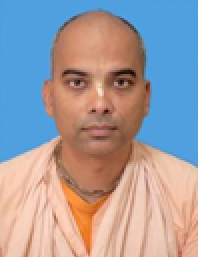 Dr. Bhaktivijnana Muni: Towards a more Harmonious Concept through the Synthesis of Vedanta and Science
Dr. Bhaktivijnana Muni: Towards a more Harmonious Concept through the Synthesis of Vedanta and Science
Although Science and Technology have made great advances, we still lack comprehensive concepts about life. Biology has not been able to explain the concept of life. The frontiers of Science in the 21st century are open to its own internal critique. The new critique is not something from without. Kant explained that “Thoughts without content are empty, intuitions without concepts are blind.” This emptiness experienced by some thoughtful disciplines within the biological community in modern times has created an internal critique which needs to be addressed though proper concepts. For example, no scientist has ever been successful in manufacturing even a single cell or a blade of grass from chemical processes alone. Life is not proving to be the same as something like a rock that could be defined in terms of finite ideas of measurements pertaining to material estimations. The attempts to grasp the essential being of life in terms of particulate approaches suffer from this defect. Reality must be approached in terms of proper concepts. Vedanta provides in axiomatic form the concept of life as ‘Life comes from life’. Moreover “Matter comes from life” is another axiomatic concept that addresses the question of origin of matter. Neither quantum mechanics nor biology is able to address the question how consciousness/observer arises and yet they require such concepts to explain the results. Modern advanced biology infers the concepts of cognition through the actual biological pathways. Without addressing the comprehensive concept of consciousness/subject/observer, we cannot explain life. In the Vedantic understanding consciousness is the immediate existential appearance of life or externalisation of spirit. Moreover, the finite spirit (the living entity or the soul) cannot be the ultimate ground of reality because of its very finiteness. Therefore Vedanta exhorts mankind to enquire both about the individual self (Who am I?) as well as about the Being of Absolute Spirit (Brahman, the Origin) and their relationship. Reality is therefore both Many as well as One. Brahman is the non-dual truth and yet it assimilates plurality and does not annihilate plurality. The Chandogya Upanishad explains, “Everything exists, but their essence is in Brahman. Or everything exists or has apparent being, but its truth or essence is in Brahman.”
India is the home of the ancient Vedantic Philosophy. It has its own axiomatic structure in which it lays down the principles and systems of proofs. Modern science basically has only two levels of epistemology (i.e. direct sense perception and inference.) But Vedanta elucidates five levels of epistemology, i.e. three higher levels. But these five levels are interpenetrating. The higher concept can come down to help an honest student to arrive at conclusions that could be appreciated even at lower levels. Scientific inquiry in Vedantic light will be to take up its axiomatic structure and engage scientific research with the higher idea and confirm it. Therefore scientists can take up the study of the two axioms mentioned above and confirm them in research. This will open new ways of thinking that was not possible in usual scientific definitions which were based upon the principle of conservation of energy. For example, even Quantum Mechanics is based upon the principle of conservation of energy and therefore in the Vedantic light how can it explain the concept of life? The essence of reality is called Brahman or the Absolute Truth. It is the source of everything animate and inanimate. Moreover, the Absolute Truth in Vedantic understanding is ultimately Personal. In the beginning Brahman is understood as the substantial truth of Reality. But in the advanced stage Absolute Truth is further realised as All-Loving, All- Merciful and fountainhead of all types of mellows and ecstasies. The Absolute comes to approach the developed consciousness with charm and not merely by power. In this way Vedanta addresses the comprehensive idea of reality in terms of the Absolute Truth which is One but which is realised in three phases of (i) Existence, (ii) Knowledge and (iii) Fulfilment.
